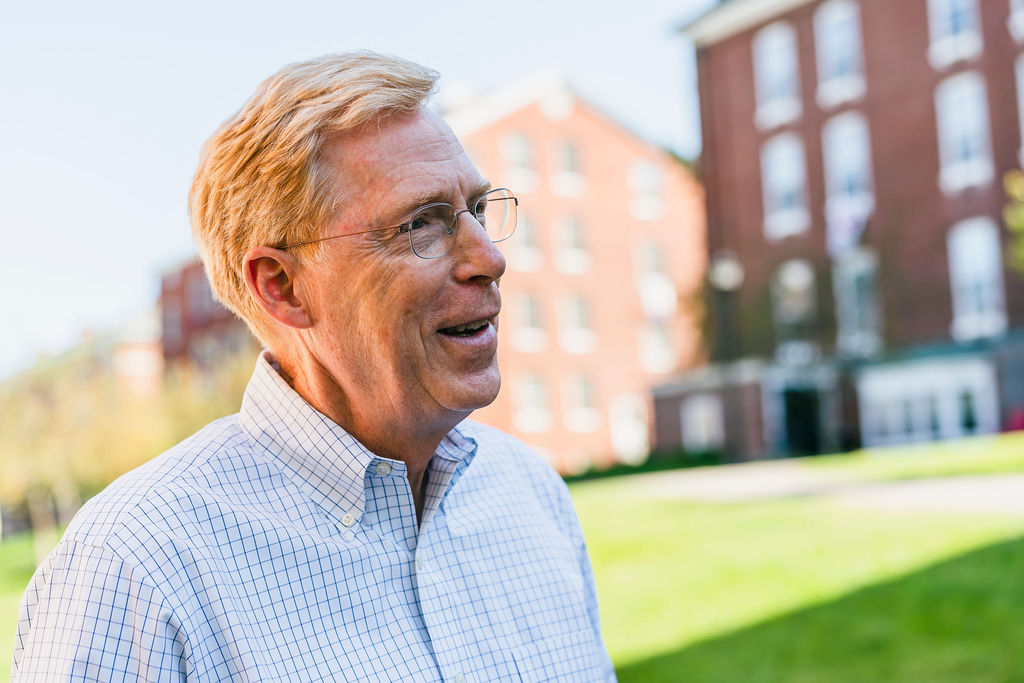We also commit to managing our campus facilities responsibly, reducing our environmental impact, and minimizing our contributions to climate change. Our plan contains ambitious goals to reduce carbon emissions by 75 % by 2031 (we are close to 60% now) and achieve zero carbon emissions by 2050. And we commit to integrating principles of sustainability into all of Exeter’s programs and operations. This means fostering a culture of sustain-ability and environmental awareness in all facets of our daily lives — where we learn, where we work, where we live, and where we play. As a school, we are aiming high and acting ambitiously to meet the environmental challenges of our day.
It has been encouraging to hear from many of you who care deeply about the issues of climate change and sustainability. I know many of our alumni are leaders in the field in their own right, and are eager to help us in this work. I am grateful for all the ways our alumni have supported our efforts thus far; your continued support will be vital to the success of this plan. In my first-ever column in this magazine in 2018, I said that Exeter has never stayed strong by staying the same. With the adoption of our first comprehensive sustainability and climate action plan, we move forward with the challenging and vitally important work of strengthening our environmental stewardship as a school and preparing our students to be environmental leaders.
This story was originally published in the Spring 2023 issue of The Exeter Bulletin.
 The document begins with a refreshed environmental mission statement and three overarching goals, then lays out a strategy to achieve them. “If Exeter is to create a truly sustainable campus and meet our responsibilities to future generations, we must set goals that match the urgency and scope of the climate crisis,” the document declares. The plan — endorsed in concept by the Trustees in January and made final this spring — leans on the good work done by the Exeter community over the last two decades and a campus culture of conservationism prevalent since Exonians commemorated the first Earth Day 53 years ago. It also recognizes that the immediacy and complexity of climate change has grown since the school’s adoption of an environmental mission statement in 2004. “Consequently,” the plan reads, “our commitment to reducing our environmental impact and educating our students [on the issue] has increased, and must continue to increase.”
The document begins with a refreshed environmental mission statement and three overarching goals, then lays out a strategy to achieve them. “If Exeter is to create a truly sustainable campus and meet our responsibilities to future generations, we must set goals that match the urgency and scope of the climate crisis,” the document declares. The plan — endorsed in concept by the Trustees in January and made final this spring — leans on the good work done by the Exeter community over the last two decades and a campus culture of conservationism prevalent since Exonians commemorated the first Earth Day 53 years ago. It also recognizes that the immediacy and complexity of climate change has grown since the school’s adoption of an environmental mission statement in 2004. “Consequently,” the plan reads, “our commitment to reducing our environmental impact and educating our students [on the issue] has increased, and must continue to increase.”
 The school has made significant progress in curbing greenhouse gas emissions, slashing output by nearly 60% since 2005. Eight buildings use geothermal wells for heating and cooling, and a solar array installed in 2018 atop William Boyce Thompson Field House has generated an annual average of 575,000 kilowatts of electricity, enough to power 54 homes.
The school has made significant progress in curbing greenhouse gas emissions, slashing output by nearly 60% since 2005. Eight buildings use geothermal wells for heating and cooling, and a solar array installed in 2018 atop William Boyce Thompson Field House has generated an annual average of 575,000 kilowatts of electricity, enough to power 54 homes.
 Biggins says that if one were to build PEA from scratch today, achieving zero carbon would be in the blueprints. “You’d have your buildings heated and cooled via heat pump, and your water heated via heat pump,” he says.
Biggins says that if one were to build PEA from scratch today, achieving zero carbon would be in the blueprints. “You’d have your buildings heated and cooled via heat pump, and your water heated via heat pump,” he says.









